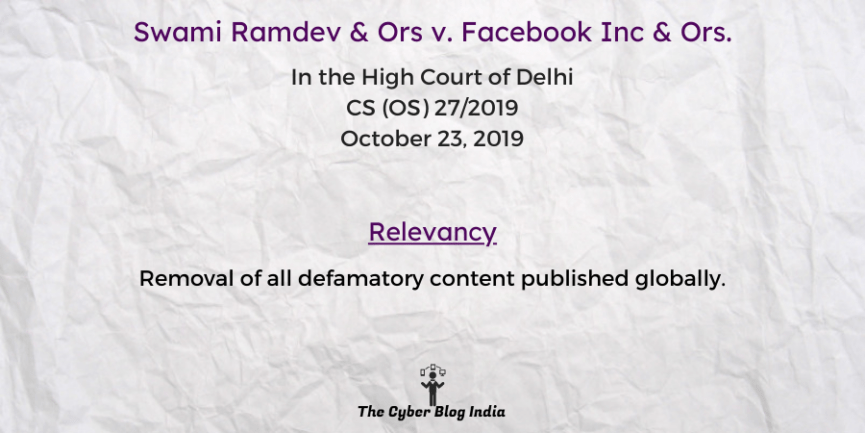Swami Ramdev and Ors v. Facebook Inc and Ors

Swami Ramdev & Ors v. Facebook Inc & Ors.
263 (2019) DLT 689
In the High Court of Delhi
CS (OS) 27/2019
Before Justice Prathiba M. Singh
Decided on October 23, 2019
Relevancy of the case: Removal of all defamatory content published globally.
Statutes & Provisions Involved
- The Information Technology Act, 2000 (Section 79, 2(1)(k), 2(1)(l), 2(1)(j), 2(1)(o))
Relevant Facts of the Case
- The plaintiffs, Baba Ramdev and Patanjali Ayurved Ltd. alleged that the defendant’s platforms disseminated various defamatory remarks and information including videos, based on a book titled ‘Godman to Tycoon: The Untold Story of Baba Ramdev.’
- The defamatory content contained in the said book was the subject matter of a previous judgment wherein a learned Single Judge of this court restrained the publisher and author from publishing, distributing, and selling the book without deleting the offending portions.
- The allegations contained in the videos uploaded on the defendants’ platforms are in fact the questionable defamatory portions in the book in the judgement. While the previous judgment remains contested before the Supreme Court, there, however, is no explicit order to stay the said Single Judge’s order.
- Furthermore, the current Court must ponder over the current question, i.e., whether to block access to the said URLs globally. However, the Court granted an interim injunction to stop the said URLs in the Indian domain.
- Thereafter, while the defendant agreed to block the URLs in the Indian domain, the plaintiffs contested it before the Court, stating that access to the URLs on any other global domain is still available in India.
Prominent arguments by Advocates
- The plaintiff’s counsel submitted that the defendants are seeking protection on the grounds that they are intermediaries. Per Shreya Singhal v. Union of India AIR 2015 SC 1523, the phrase “actual knowledge” in Section 79 is a Court order, thus, once the Court passes an order, they are bound to disable the content globally and cannot raise objections to the geographical extent of implementation of the injunction.
- Hence, if the defendants claim that they do not have an obligation to comply with the orders of the Court, then they cannot avail of the safe harbour protection. An intermediary’s role cannot be to adjudicate whether the content is defamatory or not. It must remain passive and obey the orders of the Court. They cannot argue on behalf of the person uploading the content.
- Lastly, the counsel relied on the definitions of “computer resource”, “computer system”, “computer network” and “data” under the IT Act to submit that the Act does not provide that the blocking is restricted to the Indian territory. Moreover, the harm caused is irreparable to the plaintiffs.
- The defendants’ counsel argued that the plaintiffs made no efforts to implead the person who uploaded the content. Furthermore, because the definition of defamation differs from country to country, passing an order for global removal of content would be contrary to the principle of comity of Courts. This would result in a conflict of laws, specifically in the US, where the platforms’ headquarters reside.
- Furthermore, the counsel argued that the platforms used geo-blocking to block the content in the Indian domain which is sufficient to take care of the harm to the plaintiffs.
- Lastly, the counsel submitted that a Court’s order must be proportionate to the harm caused. In the current case, there is greater harm in passing a global injunction order.
Opinion of the Bench
- The bench noted that the defamation plaint does not disclose a cause of action. Furthermore, the injunction sought was vague with respect to other URLs and links containing the infringing video. This is contradictory to the Shreya Singhal case.
- Moreover, various courts have their own standards of freedom of expression. Hence, the order of one Court cannot be expressed beyond borders. The injunction is thus, limited to India and to the said URLs.
- The bench concluded that while the Court must pass an effective order, the Court’s limited jurisdiction bars the said order. This is because the standards of free speech and expression are different in other jurisdictions.
Final Decision
- The bench directed the defendants to take down, remove, block, restrict/disable access, on a global basis, to all such videos/weblinks/URLs in the list annexed to the plaint. These are links uploaded from IP addresses within India.
- Furthermore, the defendants must disable and block access to URLs/links uploaded from outside India. They must take down any further URLs containing the said defamatory content.
इस केस के सारांश को हिंदी में पढ़ने के लिए यहाँ क्लिक करें | To read this case summary in Hindi, click here.
